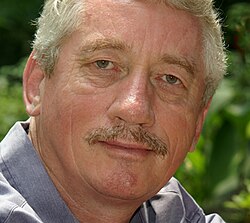Frans de Waal Quote
If you look at human society, it is very easy, of course, to compare our warfare and territoriality with the chimpanzee. But that's only one side of what we do. We also trade, we intermarry, we allow each other to travel through our territory. There's an enormous amount of cooperation.
Frans de Waal
If you look at human society, it is very easy, of course, to compare our warfare and territoriality with the chimpanzee. But that's only one side of what we do. We also trade, we intermarry, we allow each other to travel through our territory. There's an enormous amount of cooperation.
Related Quotes
Certainly we can say that the pace of modern life, increased and supported by our technology in general and our personal electronics in particular, has resulted in a short attention span and an addict...
Arthur Rosenfeld
Tags:
being, complicated, critical thinking, daoism, emotion, feeling, hectic, life, meditation, modern life
Let my silence grow with noise as pregnant mothers grow with life. Let my silence permeate these walls as sunlight permeates a home. Let the silence rise from unwatered graves and craters left by bomb...
Kamand Kojouri
Tags:
abuse, abused, activism, activism poems, activist, amnesty, bellies, bombs, broken hearts, coming together
The downfall of the attempts of governments and leaders to unite mankind is found in this- in the wrong message that we should see everyone as the same. This is the root of the failure of harmony. Bec...
C. JoyBell C.
Tags:
color, culture, difference, differences, equality, government, harmony, human, humanism, humanity
About Frans de Waal
Franciscus Bernardus Maria de Waal (29 October 1948 – 14 March 2024) was a Dutch-American primatologist and ethologist. He was the Charles Howard Candler Professor of Primate Behavior in the Department of Psychology at Emory University in Atlanta, Georgia, director of the Living Links Center at the Yerkes National Primate Research Center at Emory, and author of numerous books including Chimpanzee Politics (1982) and Our Inner Ape (2005). His research centered on primate social behavior, including conflict resolution, cooperation, inequity aversion, and food-sharing. He was a member of the United States National Academy of Sciences and the Royal Netherlands Academy of Arts and Sciences.
